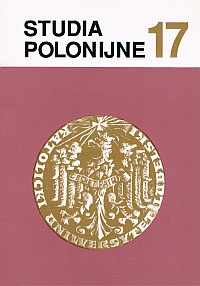The Work of the Priests of the Lvov Archdiocese in Lower Silesia
Main Article Content
Abstract
The first years in the history of the Wrocław archdiocese after the Second World War were extremely important and had innumerable consequences. By virtue of the Yalta-Potsdam Agreement the German population which inhabited the territories regained by Poland was displaced to Germany. The territories they had abandoned were then settled by the Poles from Eastern borderland, partly from central Poland, and by the reemigrants from France, Belgium, Germany and Yugoslavia.
The newcomers had quickly integrated in this territory, owing to the Church and priests who promptly came there with the first settlers. The migrants and reemigrants, especially the expatriates, urgently wanted to have a church and priests where they settled.
August Hlond, the primate of Poland, made some decisions which were crucial for the sake of the future of the Church in those territories. In mid-August 1945 he issued decrees which established apostolic administrators in the Regained Territories. On September 1st, Rev. dr. Karol Milik took office in the Wrocław Church. He could warrant stability of the Polish church authority in those territories.
Lack of churches posed an enormous obstacle in the way to carry out regular pastoral work. Most of the Silesian churches were ruined. The priests expatriates faced the greatest burden to remove the effects that the war had wrought in the church substance; there were among them the priests from the Lvov archdiocese. They arrived here well-prepared, in terms of their seminarial and university background and pastoral practice in that difficult borderland territory. They did not lose heart, despite what they had gone through during the war and despite the fact that they had lost their mother parishes. They flung themselves in the whirl of pastoral, difficult and pioneer, work. Pastoral work went hand in hand with the construction of churches.
Holy masses and devotions gathered Poles in temples. It is in them that they felt safe. They waited for the word of God and knelt to confession. Baptisms, marriages and funerals meant for many people links with faith. The priests knew that they could not squander this confidence. They took the youngest generation − children and youth − into greatest care. Catechism, preparation for the Holy Confession and the first Holy Communion constituted the province of priestly work to which they devoted themselves completely.
In 1947 the priest administrator decided to found a Theological Seminary in Wrocław. The former graduates of the Theological Faculty of Jan Kazimierz University in Lvov rushed to his aid. They reinforced the didactic staff of the seminary. One of its lecturers was Rev. dr. Wincenty Urban, the future auxiliary bishop in Wrocław.
Out of more than 300 priests who had come with the people displaced to the Regained Territories from the former Lvov archdiocese only few are still alive. Many of them lie buried at the parochial cemeteries of Lower Silesia. The present generation reap the benefit of their labour, and merit from what they had sown for the sake of the Polish future in that land.

